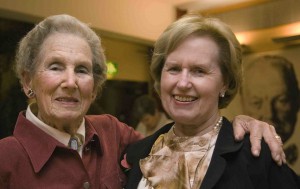Churchill’s Common Touch (5)
Part 5: Loyalty

Churchill had “a reputation for brusqueness strengthened by his handling of the common folk,” his postwar bodyguard Ronald Golding continued.
He had the habit of summing people up after two sentences of conversation. They were classified, it seemed to me, as either “interesting” or “uninteresting.” With the former, conversation ensued; with the latter, Churchill would ignore them. On such occasions Mrs. Churchill frequently came to the rescue, engaging the luckless in conversation. If they were tongue-tied she would do most of the talking until it was time for them to leave. Mrs. Churchill was a charming woman, who rescued many social and civic events because of the inability of her husband to engage in small talk.
With those he found “interesting,” and certainly the many who served him for lengthy periods, Churchill developed fierce affection and an unshakeable loyalty.
“Loyalty is a very wonderful quality,” Churchill’s wartime secretary Elizabeth Layton Nel wrote,
I am sure that such feelings in the staff were reinforced by the loyalty which Mr. Churchill himself always showed toward them. Once accepted as a member of his staff, one would not be pushed off; one’s errors might be pointed out with vehemence, but they would soon be forgiven; one’s efforts on his behalf were appreciated, in the long run. Indeed I think he became attached to his staff, and in general he greatly disliked changes.
Elizabeth remembered a particularly emotional moment at Downing Street during Victory in Europe Day, 8 May 1945, the height of Churchill’s victory:
As I was leaving the scene there arrived dear old Mrs. Landemare, the Churchills’ cook throughout the war, who had been unable to leave her kitchen sooner and had thus battled her way through those corridors too late to see the fun. Mr. Churchill, full of the moment of triumph, was just going off with his Ministers; but on seeing her he broke away from them, came and shook her hand and thanked her for having looked after him so well through those years. When he had gone she turned to me almost in tears, and said that being spoken to like that meant much more to her than just seeing the crowds.
“In thinking of him nowadays in a general way,” Elizabeth told me, “I remember particularly how he endeared himself to those around him—and how funny he always was. As long as one could ‘take it,’ one loved him with a deep devotion. Difficult to work for? Yes, mostly. Lovable? Always. Amusing? Without fail.”
________
N.B. Mrs. Landemare’s cookbook, long out of print, has recently been republished.







2 thoughts on “Churchill’s Common Touch (5)”
He was human and he made mistakes. Being who he was, the mistakes were often on a grand scale. But so were the successes. And by and large, the average wasn’t too bad.
Wonderful characterizations of Churchill’s personality. It makes one think that SOME PEOPLE did get the impression he was brusque or hard to work for but that the people who knew him understood him and loved him. He forgave and they forgave. I have the impression that people always knew where they stood with him. It is terrible not to know where you stand and to be left in the lurch. I have read many books about Churchill but this story of Georgina Landemare is quite new to me. There is always something to learn about Sir Winston. Not only a great and good man but a fascinating man. He was, as I have said, a man of his class and age (who isn’t? ) but I think he was above all an individualist who went beyond the stereotypes.
Comments are closed.